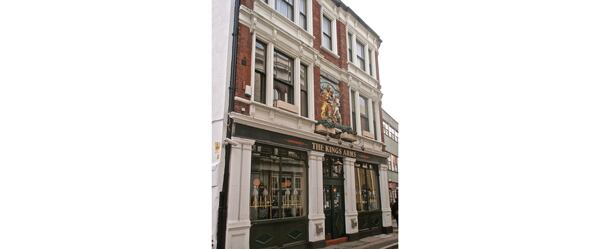Bill and his wife Margaret have recently retired from their pub the Kings Arms in London’s Borough. But calling time doesn’t mean the end of his campaigning, as he explained to the Publican's Morning Advertiser.
How did you get into the pub trade?
When we first entered the industry in 1969, my wife was a stocktaker and I was a printer. We took our first tenancy in Northfleet, Kent, with the Courage brewery (one of the companies known as the ‘Big Six’ which was both a brewer and operator) and went on to run more pubs during the years.
We were Courage tenants until the 1990s when Inntrepreneur (set up after the Beer Orders and initially owned by Grand Met and Foster’s Brewing) was created, but I wasn’t too happy about that and didn’t want to sign the lease.
What’s had the biggest impact on the trade in your time?
The Beer Orders in 1989 (which recommended that the major brewers sell off huge chunks of their estates to ensure competition in the market). Courage had to transfer a number of pubs to free-of-tie as a result.
I might have left my pub but I have not left the industry - I would need a heart transplant for that
This was mainly done by lawyers in the middle of the night who didn’t really know the properties they were dealing with. We moved over to a free-of-tie, 20-year lease at the Kings Head, in Bexley village, Greater London. However, the pub prospered under the tenancy model because it had good barrelage and a brewer that was interested in the beer that we sold, as well as our welfare.
That all changed with leases and it became a poorer business arrangement because the new owners really didn’t care as long as you bought beer off them and paid the rent.
The day the Beer Orders came in, the relationship between publicans and pub-owning companies changed. Before, your district manager would come to your kids’ christenings because you were all part of a big family.
The better you did, the more encouragement you got. Since the Beer Orders, it’s been a constant struggle to achieve a normal relationship because it’s been ‘us and them’. You have to wonder whether it was all for the best.
What happened to you after the Beer Orders?
In 1996, we sold the Kings Head as the economic climate changed, but we did very well and enjoyed our years there. We had also bought the lease on another pub in 1988 — the Swan, in West Wickham, before selling it in 1999.
We then came into Enterprise lease the Kings Arms, in Borough (below), where we only intended to stay for a little while because my wife and I were already in our 50s — but we just carried on.

You have been a strong campaigner and were a founding member of the GMV. Can you reflect on that part of your career?
The GMV (Guild of Master Victuallers) was a phoenix out of the closure of the National Licensed Victuallers Associations (NLVA) in the 1990s. The NLVA was unwieldy and didn’t change with the times, so the GMV was set up in the south of the country.
During the years, with the other associations and the Federation of Licensed Victuallers Associations, we have campaigned for a better deal for publicans and a fairer slice of the cake for tenants who don’t always get the financial reward they deserve.
When do you feel progress started to happen with changing the pubco/tenant relationship?
We struggled our way through the jungle and it wasn’t until we truly got together with other relevant associations including Fair Pint, the Campaign for Real Ale, as well as help from educated MPs, that we started to make progress. If you think about it, this ‘rag bag’ of people managed to get the ears of parliamentarians and Lords. This group was called the Independent Pub Confederation, set up to fight for licensee rights, and at the time it was thought a working publican would be more appropriate as chairman, so I took the role.
What will you do now?
I might have left my pub but I have not left the industry — I would have to have a heart transplant for that to happen. I am retiring to Dorset to spend more time with the family including my six grandchildren.
I am looking forward to keeping my hand in with the different groups and committees especially the Pub Governing Body and the All-Party Parliamentary Save the Pub Group. I will always help licensees and will carry on doing so until I am told I am not needed or until I can’t do the job any more.
